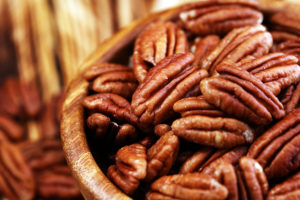How Do We Get Pecans? | Natchitoches Fresh Pecans
Posted by wernuts2 on 16th Nov 2018
 When you buy your Louisiana pecans from us, you’re right at the tail end of a very long, and time-tested process. All you have to do is pick your pecans, hand over your money, and enjoy! But what exactly happens to get those pecans into the store, or even into your mail, so that you can find them waiting for you right at your door? Do you know what goes into growing and harvesting pecans? We do, and we’re going to explain that now.
When you buy your Louisiana pecans from us, you’re right at the tail end of a very long, and time-tested process. All you have to do is pick your pecans, hand over your money, and enjoy! But what exactly happens to get those pecans into the store, or even into your mail, so that you can find them waiting for you right at your door? Do you know what goes into growing and harvesting pecans? We do, and we’re going to explain that now.
It’s A Tree
The pecan is a nut, which means that it actually comes from a tree. For some people, this might be confusing, as they view peanuts as nuts, and that comes from plants, with the peanuts themselves needing to be dug up from underground. However, a pecan, like a walnut, or chestnut is a “true” nut, and comes as a result of tree growth and reproduction. However, the time to get a pecan that can be plucked and harvested from a tree requires a huge amount of patience. For example, if, one day, you decided to plant a pecan nut in your backyard, so that your infant child could enjoy pecans from the backyard, that child would have a pretty long wait! From a single nut, it can take between 5-7 years before a pecan tree matures enough to start producing nuts of its own! This is the cheapest way to enjoy free pecan nuts, but you’d better be prepared to wait!
The Industrial Shortcuts
There are a few ways that this growth period can be lessened, but even then, a lot of planning and patience is required. If you want to speed things up a bit, you can go to a professional and buy a pecan seedling tree. Depending on the maturity of the seedling, you might expect to cut down your waiting period by 2-4 years, so not bad, but still not exactly a blazing fast time. A still faster, but more expensive solution is to buy what is called a “grafted tree.” These are pecan trees that have already had a few years of growth, and about five to six feet in height already. Of course, you’re going to be paying quite a bit more since someone else has already used up a lot of time and expertise getting the tree to this stage of its development, but you’ll see pecan nuts from a tree like this in just 3-4 four years, so it’s the “fastest” comparatively speaking of the available methods, but even this is not an overnight process.
Placement Counts Too
Of course, one big issue if you want to pluck Louisiana pecans from a tree in your own yard is geography. Pe-cans are not the hardiest trees in the world, and need a warmer, more forgiving climate. While there are other types of pecans that can actually survive the snowfall of a northern winter, the Louisiana pecan, as the name implies, does much better in the southerly climes of the USA.
